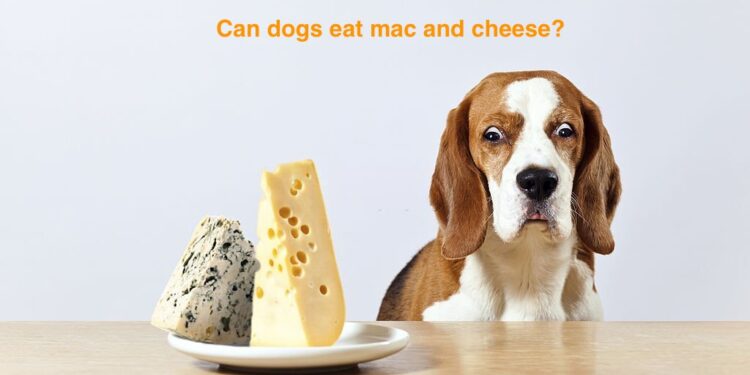Introduction
As a pet owner, it’s natural to want to share your favorite foods with your furry companions. However, not all human foods are safe for dogs to consume. One popular dish that often raises questions among dog owners is mac and cheese. Can dogs eat mac and cheese? In this comprehensive guide, we will explore the safety and potential risks associated with feeding mac and cheese to dogs.
Can Dogs Eat Mac and Cheese?
Dogs have different nutritional needs compared to humans, and their digestive systems are not designed to handle certain foods that we consume regularly. Mac and cheese, while a delicious comfort food for us, may not be the best choice for our canine friends.
Mac and cheese typically contain ingredients like pasta, cheese, milk, and butter. While these ingredients may not be toxic to dogs in small quantities, they can still pose potential risks. Let’s take a closer look at the individual components to understand why mac and cheese may not be suitable for dogs.
Pasta
Pasta itself is not harmful to dogs when cooked plain and served in moderation. It can provide carbohydrates for energy. However, the pasta in mac and cheese is often mixed with ingredients like cheese sauce, which can be problematic for dogs.
Cheese
Cheese is a common ingredient in mac and cheese, and many dogs enjoy its taste. However, cheese is high in fat and lactose, which can cause digestive issues for dogs. Some dogs may be lactose intolerant, leading to symptoms like diarrhea, gas, and bloating. Moreover, the high-fat content can contribute to weight gain and other health problems.
Milk and Butter
Milk and butter are used to create the creamy texture in mac and cheese. Dogs, particularly adult dogs, have difficulty digesting lactose, the sugar found in milk. Feeding them foods containing lactose can result in gastrointestinal upset. Butter, although not toxic to dogs, is also high in fat and can contribute to obesity and pancreatitis if consumed in excess.
Potential Risks of Feeding Mac and Cheese to Dogs
While mac and cheese may not be toxic to dogs, it’s important to consider the potential risks associated with feeding this dish to your furry friend.
- Digestive Upset: The high-fat content and lactose found in mac and cheese can lead to digestive issues such as diarrhea, vomiting, and abdominal discomfort.
- Weight Gain: Mac and cheese is calorie-dense, and regular consumption can contribute to weight gain in dogs. Obesity can lead to various health problems, including joint issues, diabetes, and heart disease.
- Pancreatitis: The high-fat content in mac and cheese can increase the risk of pancreatitis in dogs. This condition is characterized by inflammation of the pancreas and can be life-threatening if left untreated.
- Lactose Intolerance: Dogs, like some humans, can be lactose intolerant. Feeding them mac and cheese can result in symptoms like gas, bloating, and diarrhea.
- Nutritional Imbalance: While dogs can benefit from a variety of human foods in moderation, a diet consisting primarily of mac and cheese lacks the essential nutrients dogs need for optimal health. It’s important to provide them with a balanced diet formulated specifically for their nutritional requirements.
Conclusion
While dogs can enjoy a wide variety of human foods in moderation, mac and cheese is not the best choice for them. The high-fat content, lactose, and potential digestive upset make it a less suitable option. It’s crucial to prioritize your dog’s health and well-being by providing them with a balanced diet formulated for their specific needs. If you have any concerns or questions about your dog’s diet, always consult with your veterinarian for professional advice.
Read Also Can Dogs Eat Cream Cheese?
FAQs about Dogs and Mac and Cheese
1. Can dogs have mac and cheese as an occasional treat?
While it’s generally not recommended to feed mac and cheese to dogs, an occasional small bite as a treat may not cause harm. However, it’s important to monitor your dog for any signs of digestive upset and consult with your veterinarian if you have concerns.
2. Are there any dog-friendly alternatives to mac and cheese?
Yes, there are dog-friendly alternatives to mac and cheese that you can offer your furry friend. Cooked plain pasta or a small amount of plain cooked chicken without seasoning can be safer options. However, it’s always best to consult with your veterinarian before introducing any new foods into your dog’s diet.
3. What should I do if my dog accidentally eats a large amount of mac and cheese?
If your dog accidentally consumes a large amount of mac and cheese or shows signs of digestive distress after eating it, contact your veterinarian immediately. They can provide guidance based on your dog’s specific situation.
4. Are there any health conditions that make mac and cheese more dangerous for dogs?
Dogs with pre-existing health conditions, such as pancreatitis or lactose intolerance, are more susceptible to the risks associated with mac and cheese consumption. It’s crucial to consult with your veterinarian to determine the best dietary choices for your dog’s specific needs.
5. What are some healthy alternatives to mac and cheese for dogs?
If you’re looking for healthy alternatives to mac and cheese for your dog, consider options such as cooked plain sweet potatoes, green beans, or pumpkin puree. These foods can provide nutritional benefits without the potential risks associated with mac and cheese.
6. Can puppies eat mac and cheese?
Puppies have delicate digestive systems that are still developing. Feeding them mac and cheese can disrupt their digestive balance and potentially lead to more severe issues. It’s advisable to stick to a balanced puppy diet recommended by your veterinarian.












